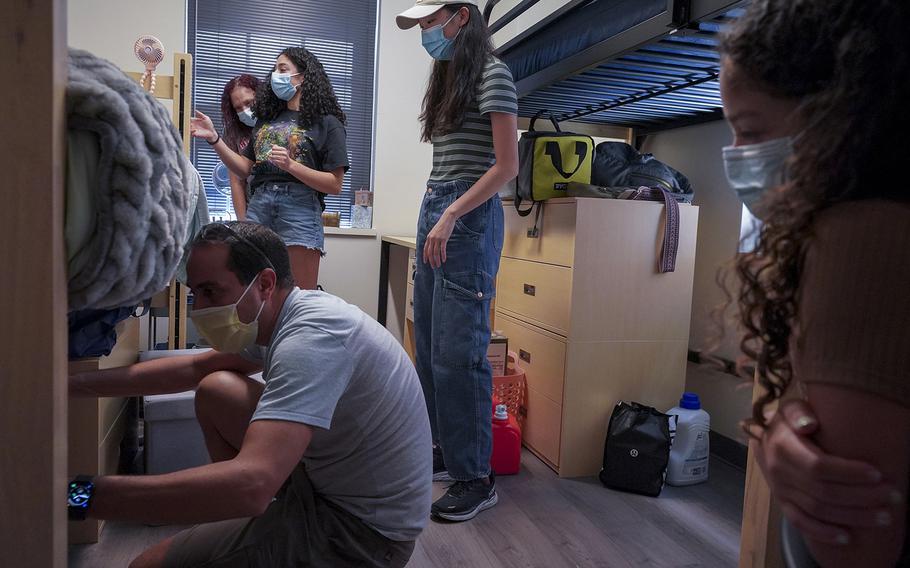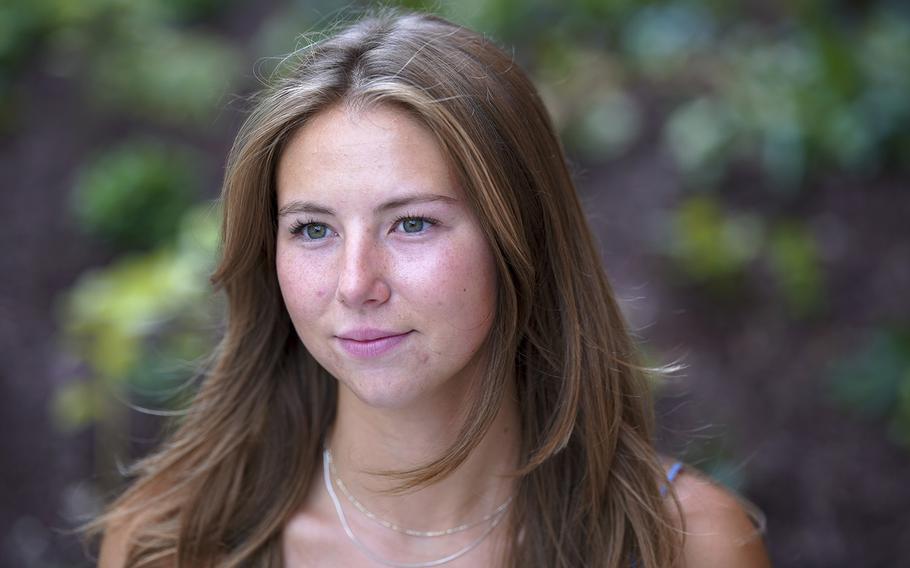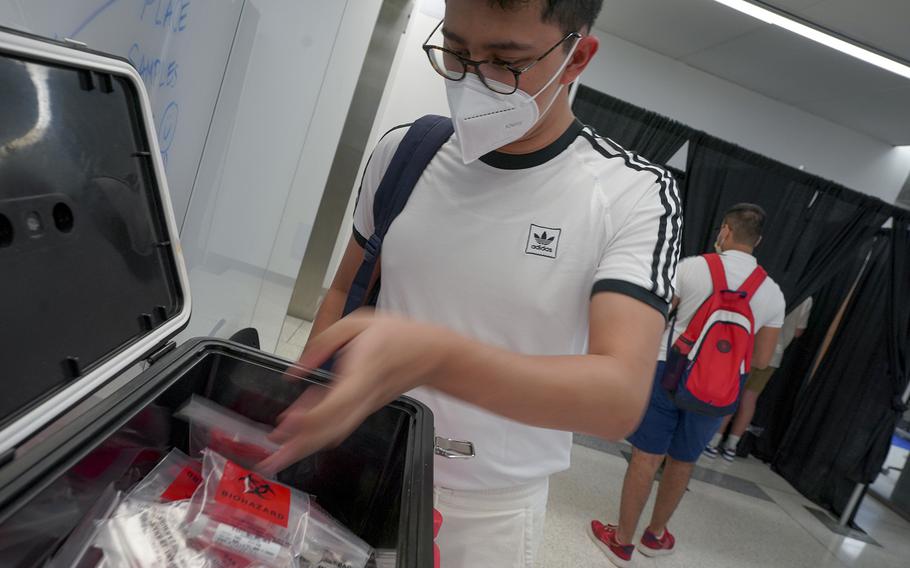
New roommates Julie Marwan, rear, and Lily Huang, center, get help from Marwan’s parents, Rony Marwan, foreground, Dalia El-Prince, rear left, and Lila Marwan, 9, as they move into their room at George Washington University. (Bonnie Jo Mount/Washington Post )
Stars and Stripes is making stories on the coronavirus pandemic available free of charge. See more stories here. Sign up for our daily coronavirus newsletter here. Please support our journalism with a subscription.
WASHINGTON — At George Washington University, masks are still mostly required indoors. So is vaccination against the coronavirus, with a booster shot. So is viral testing for students returning to campus.
Catholic University, a few miles away, makes all of that optional.
The two universities in the nation's capital illustrate divergent strategies on public health as colleges head into the third fall term since the shocking pandemic upheavals of early 2020.
While the rules are tighter in some places, looser in others, the goals everywhere remain the same: Contain the lingering threat of covid. Keep classes running and students enrolled.
For their part, students are feeling relief even in places that continue with relatively strict protocols.
"At this moment in time, I feel the most free to do what I want without a general worry and concern," said Isabella Banks, 20, a junior at GWU. "That's changed over the years. When I first set foot on campus, I was like, public health is everything."
Now, she said, the situation has morphed from crisis to routine. But it remains a constant in her thoughts. "I don't think I have ever monitored how much I'm washing my hands as much as I have in the past two years," she said.

George Washington University junior Isabella Banks spent time on campus with significant public health rules during each of her first two school years. (Bonnie Jo Mount/Washington Post )
Around the country, colleges divided sharply last year on whether to require vaccination. That split endures. The University of California at Berkeley, for instance, mandates the coronavirus vaccine and, for those who are eligible, a booster shot. The University of Texas at Austin doesn't require them but "strongly encourages" them.
Isolation rules for those infected with the virus and quarantine rules for those exposed to it appear to be easing in many places. So are strict indoor masking policies. UC-Berkeley, which required face covering indoors a year ago, now strongly recommends that masks be worn indoors regardless of vaccination status.
In the Washington region, indoor mask policies vary in detail from one campus to another. How much the rules will be followed, and how closely they will be enforced, remains to be seen.
Georgetown University said masks are required in classrooms and laboratories during instruction. They are also mandated in health facilities and early-childhood education centers, and on university shuttles. But they are otherwise optional.
American University said masks are optional in most places but required during classes. "Our hope is to ultimately reach a point where masks can be optional in the classroom," AU officials wrote on Aug. 11.
Howard University said its faculty may require masks for individual classes. The University of Maryland said masks are mostly optional but, as of Friday, it had not yet decided whether to require them during classes. George Mason University, in Northern Virginia, said masks are optional.
At Trinity Washington University, masks are required indoors. Patricia McGuire, president of the Catholic women's college, said the campus community has supported the mandate.
Trinity Washington also requires vaccination against the coronavirus.
"Our philosophy here is to be wary and to take what we believe are very prudent actions," McGuire said. "Everybody here is preoccupied with 'Are we being safe enough?' Nobody here, I can tell you, nobody resisted masks."
Catholic University, which neighbors Trinity, has much less restrictive policies. But Catholic said it follows guidance from public health authorities, including the Centers for Disease Control and Prevention.
"Throughout the pandemic Catholic University has implemented COVID protocols that have both aligned with DC and CDC guidelines, and that have worked best for our community," Karna Lozoya, vice president for university communications, said in a statement. "We have successfully navigated this pandemic for two years, and we will continue to actively monitor COVID as well as other health threats as they emerge."

Sam Avila, a first-year graduate student, submits a viral test sample at George Washington University. Coronavirus testing is an entry requirement for the campus. (Bonnie Jo Mount/Washington Post )
At GWU, the largest university in Washington, more than 2,700 freshmen were scheduled to arrive in waves starting on Saturday.
They will be required to participate in viral testing when they arrive, but there will be no ongoing testing mandates during the semester. Georgetown has a similar policy.
GWU officials said their public health protections were geared toward providing the most wide-open campus experience since fall 2019.
"They will be able to engage with each other," said Colette Coleman, GWU's vice provost for student affairs and dean of students. "Make friends, socialize in the halls and get acclimated to being a college student."
The university also is celebrating the opening of a renovated first-year dormitory on F Street NW, Thurston Hall, with 820 beds.
Previously in the pandemic, move-in days were tightly orchestrated, with timed entry to ensure minimal contact among groups of people and reduced chances of viral spread. In August 2021, Coleman said, move-in was a "traditional-ish college experience." Many were simply grateful to be able to be on campus.
This year, there will still be designated arrival periods. But the two-hour windows of time for entry will overlap. That will create more opportunities for mingling.
GWU officials, like others around the country, are also reminding students to be on guard against a new threat, monkeypox, which causes painful rashes. That virus can spread through intimate skin-to-skin contact and contact with sheets and towels used by infected people, so the university is urging students to do their laundry regularly.
Compared to her first two years at GWU, Banks said she feels much more at ease. The junior from Brunswick, Maine, is majoring in international affairs and helping this summer with student orientation.
In her first year, Banks was one of the very few students allowed to live in a GWU dorm starting in January 2021. "I had a single in what was supposed to be a double," she recalled. "To say it was a ghost town was an understatement."
She wore masks everywhere, except when alone in her room, and she had minimal contact with other students. "It was definitely weird," she said. That May she got vaccinated at the Walter E. Washington Convention Center. "I felt like I could finally breathe."
In her second year, things opened up much more. But masks were still ubiquitous, she said, and viral testing was mandatory once a week. She got tested twice a week, just to be cautious. "All of us had an extra sense of purpose to make sure we were following covid protocols," she said. "We knew we didn't want to have to go back home again." Yet Banks said she and her roommate came down with less severe cases of covid in April and isolated for six days.
Now, Banks is looking forward to an almost-unfettered year, including a planned spring semester in Madrid. But she still plans to carry a mask everywhere and pay attention to door handles and other surfaces she touches. "I definitely think about public health more than I ever have in my life," she said.